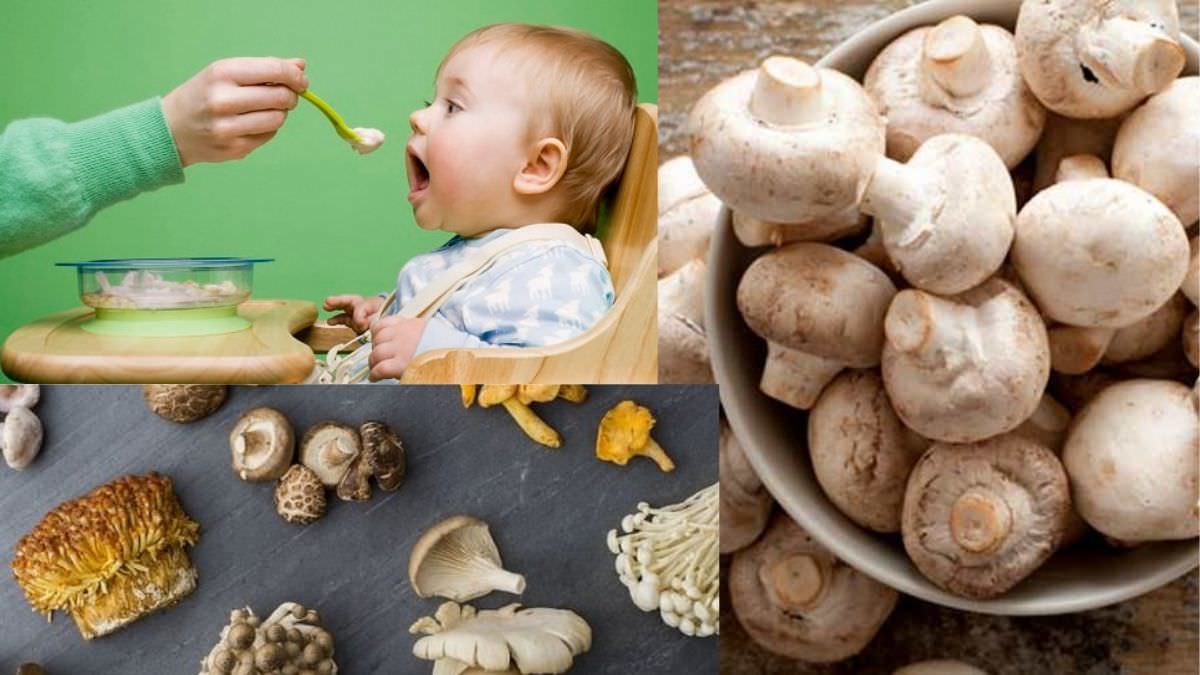Can babies eat mushrooms? It has been a debatable question since long, let’s unravel the answer to it in depth in this article!

Mushrooms are fungi that belong neither to the plant kingdom nor the animal kingdom. They have been used both as food and as medicine for centuries. Among the 10,000+ species of mushrooms currently known, only 4% are edible. Poisonous varieties of mushrooms also occur, and hence it is prudent to source them from a reputable retail store. Agaricus bisporus is a species of edible mushrooms under which the most common varieties of mushrooms, namely white button, cremini, and the portobello, fall.
Nutritional properties:
- Mushrooms have a high water content of almost 90%.
- It has significant dietary fiber and protein. and is rich in Omega 6 fatty acids.
- It has vitamins C, B1, B2, B3, and B9 and ergosterol( a precursor of vitamin D2).
- Mushrooms exposed to sunlight when being cultivated synthesize vitamin D2, making them the only non-animal dietary vitamin D source.
- Sodium, Potassium, Calcium, Phosphorus, Selenium, Iron, copper, and Pantothenic acid form the mineral profile.
- It has negligible amounts of fat and no cholesterol
- They are rich in bioactive compounds, polysaccharides, triterpenoids, and phenolic compounds, which positively affect health.
Can Babies Eat Mushrooms?

Mushrooms are easy and fast to cook and are easily digestible. You can include them in your baby’s diet right from their 6th month when they start eating solids. Some parenting websites do advise parents to wait until the child is about a year old. Therefore, it is prudent to consult a pediatrician before introducing new foods like mushrooms in your baby’s diet.
- The common edible mushroom varieties are the white button, cremini, porcini, portobello, shiitake, and oyster mushrooms.
- Bioactive compounds and minerals: Activates the different types of immune system cells in babies and hence boosts immunity.
- Soluble dietary fibers and Vitamin D: Improves your heart health and builds healthy bones respectively.
- Oligosaccharides: Work as probiotics facilitating the growth of beneficial microbes, which prevent diseases like obesity and cancer in the long run.
- Mushrooms have antioxidant, anti-microbial, anti-viral, and anti-inflammatory effects.
- The hepatoprotective property of mushrooms protects your liver from damage.
How to incorporate mushrooms in your baby’s diet?
- You should ensure that the mushrooms are fresh and cleaned and cooked well before feeding them to babies.
- The standard button mushrooms are an excellent first option for babies.
- You can slice and sautée them with salt and pepper and feed them as finger foods.
- The best ways to introduce mushrooms are to use them finely chopped in soups, added to rice or pasta dishes, and baked with cheese.
Precautions:

- Your babies should never be fed raw or undercooked mushrooms as sometimes spores released from mushrooms can cause allergy in some babies.
- Raw mushrooms can be difficult to digest and can cause gastric discomfort.
- Wild mushrooms can cause poisoning.
- It is better to source mushrooms from a reliable vendor and chooses ones that are fresh, white, clean, have closed caps, and are without damage or discoloration.
Alternatives to mushrooms:
If your baby is allergic to mushrooms or is not fond of its taste, these are the substitutes you can try
- Zucchini
- Eggplants
- Sun-dried tomatoes
- Chickpeas
- Russet potatoes or,
- Garbanzo beans



